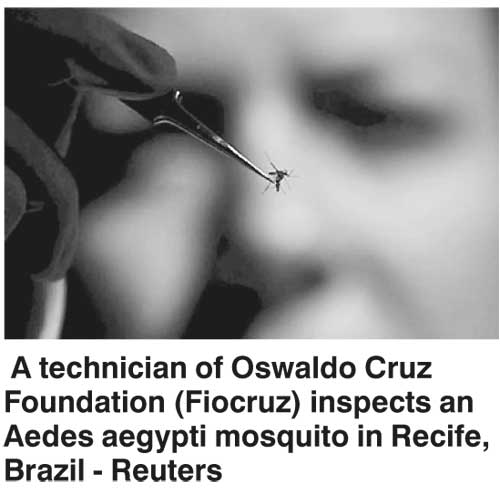Friday Feb 20, 2026
Friday Feb 20, 2026
Saturday, 6 February 2016 01:47 - - {{hitsCtrl.values.hits}}
Reuters: Brazilian health officials said on Thursday they have confirmed two cases of transmission of Zika through transfusions of blood from donors who had been infected with the mosquito-borne virus that is spreading rapidly through the Americas.
Marcelo Addas Carvalho, Director of the Blood Centre at the Sao Paulo state University of Campinas, said genetic testing confirmed that a man who received a blood transfusion using blood from a donor with Zika in March 2015  became infected with the virus, although the patient did not develop symptoms.
became infected with the virus, although the patient did not develop symptoms.
Earlier, the health department of Campinas, an industrial city near Sao Paulo, said a man with gunshot wounds became infected with Zika after multiple blood transfusions in April 2015 that included blood donated by an infected person.
Carvalho said the infection of the wounded man was most probably caused by the transfusion but genetic tests have not yet been conducted to confirm it. He said it was very unlikely the infection was caused by a mosquito bite because the patient was in a hospital intensive care unit for three months.
The patient later died from his gunshot wounds and not the Zika infection, local health officials and Carvalho said.
“The two cases can be considered transmission of the virus through blood transfusion, with greater certainty in the first because we did genetic sequencing comparing the virus in the donor and to the virus in the recipient,” he said by telephone.
Zika is usually contracted via mosquito bites, so transmission of the illness through blood transfusions adds another concern to efforts to contain the outbreak. Some countries have tightened procedures for blood donations, to protect blood supplies.
Zika has been reported in 30 countries since it first appeared in the Americas last year in Brazil, where it has been linked to thousands of babies being born with microcephaly. This is a condition where infants have abnormally small heads and often have underdeveloped brains.
Brazil’s Health Ministry, leading efforts to contain a public health emergency in the country worst hit by the virus, emphasised in a statement that the recipient died of his wounds and not from the Zika infection.
It said it was reinforcing instructions to blood banks that people infected with Zika or dengue not be permitted to donate blood for 30 days after full recovery from the active stage of Zika infection.
On Tuesday, the American Red Cross urged prospective donors who have visited Zika outbreak zones to wait at least 28 days before giving blood, but said the risk of transmitting the virus through blood donations was ‘extremely’ low in the continental United States. The agency asked donors who give blood and subsequently develop symptoms consistent with Zika within 14 days to notify the Red Cross so the product can be quarantined.
Also causing concern is the possibility of transmission through sexual contact. Health officials in Texas reported on Tuesday that a person in Dallas became infected after having sex with another person who had travelled in Venezuela, where the virus is circulating.
Spain reports first known European case of Zika-infected pregnant woman
MADRID (AFP): Spain said on Thursday (4 Feb) that a pregnant woman who had returned from Colombia had been diagnosed with the Zika virus, in the first such known European case. |